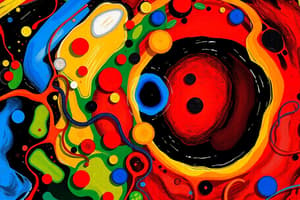Podcast
Questions and Answers
What is the primary energy currency of the cell?
What is the primary energy currency of the cell?
- Guanosine triphosphate (GTP)
- Adenosine triphosphate (ATP) (correct)
- Cytidine diphosphate (CDP)
- Adenosine monophosphate (AMP)
Which organelle is responsible for the majority of cellular respiration and energy production?
Which organelle is responsible for the majority of cellular respiration and energy production?
- Golgi Apparatus
- Mitochondria (correct)
- Endoplasmic Reticulum
- Ribosome
What are the two main branches of the immune system?
What are the two main branches of the immune system?
- Acquired immune system and Natural immune system
- Primary immune system and Secondary immune system
- Innate immune system and Adaptive immune system (correct)
- Extrinsic immune system and Intrinsic immune system
Which cell components produce specific antibodies or kill infected cells?
Which cell components produce specific antibodies or kill infected cells?
What do cells convert food molecules into to produce energy?
What do cells convert food molecules into to produce energy?
Which macromolecule provides tensile strength and flexibility to connective tissues in vertebrates?
Which macromolecule provides tensile strength and flexibility to connective tissues in vertebrates?
What are the three broad categories in which cell functions can be classified?
What are the three broad categories in which cell functions can be classified?
What is the main role of elastin in the extracellular matrix (ECM)?
What is the main role of elastin in the extracellular matrix (ECM)?
Which macromolecule plays a role in lubrication, hydration, and shock absorption?
Which macromolecule plays a role in lubrication, hydration, and shock absorption?
Why is structural support provided by the extracellular matrix (ECM) essential for tissues and organs?
Why is structural support provided by the extracellular matrix (ECM) essential for tissues and organs?
Flashcards are hidden until you start studying
Study Notes
Introduction
Human cell biology refers to the study of the structure, function, and behavior of cells within the human body. This branch of biology encompasses various aspects, including cell structure, division, growth, and reproduction. Understanding human cell biology is crucial for comprehending the fundamental processes that sustain life and contribute to the development of diseases and conditions that affect humanity.
One significant aspect of human cell biology is the function of cells. Functions can be broadly classified into three categories: structural support, metabolic activities, and immune defense. Each category plays a vital role in maintaining homeostasis and ensuring proper functioning of the organism.
Structural Support
Structural support is provided by extracellular matrix (ECM), a network of complex macromolecules secreted by cells. These macromolecules include collagen, elastin, and proteoglycans. The ECM provides mechanical strength, resilience, and stability to tissues and organs, allowing them to maintain their shape and perform their respective functions efficiently.
For example, collagen is the primary component of connective tissue in vertebrates, providing tensile strength and flexibility to structures such as skin, bone, and ligaments. Elasticity is contributed by elastin, while proteoglycans play a role in lubrication, hydration, and shock absorption. Together, these macromolecules maintain the structure of the human body and allow for efficient function of its various systems.
Metabolic Activities
Cell metabolism is a complex set of processes that occur within cells to maintain life. It involves the conversion of food molecules into energy, the synthesis of various macromolecules (proteins, lipids, carbohydrates, and nucleic acids), and the elimination of waste products.
Mitochondria, a specialized organelle found within eukaryotic cells, are responsible for the majority of cellular respiration and energy production. They generate adenosine triphosphate (ATP), the primary energy currency of the cell, through a process called cellular respiration. This energy is used to power various cellular processes, such as transport of molecules across the membrane, protein synthesis, and DNA replication.
Immune Defense
The immune system is a complex network of cells, tissues, and organs that work together to protect the body from pathogens and foreign substances. It is critical to maintaining health and preventing diseases.
The immune system is composed of two main branches: the innate immune system and the adaptive immune system. The innate immune system provides a general defense against pathogens, while the adaptive immune system offers a more specific response tailored to the pathogen encountered.
Key cellular components of the immune system include phagocytes (such as macrophages and neutrophils), which engulf and destroy pathogens, and lymphocytes (B cells and T cells), which produce specific antibodies or kill infected cells. The immune system is constantly surveilling the body, identifying and eliminating threats to maintain health and prevent disease.
Conclusion
Understanding the function of cells is crucial for comprehending the complex processes that sustain life and contribute to the development of diseases and conditions that affect humanity. The structural support, metabolic activities, and immune defense functions of cells work together to maintain homeostasis and ensure proper functioning of the organism. By studying human cell biology, we can gain valuable insights into the fundamental processes that govern life and ultimately improve our understanding of health and disease.
Studying That Suits You
Use AI to generate personalized quizzes and flashcards to suit your learning preferences.




